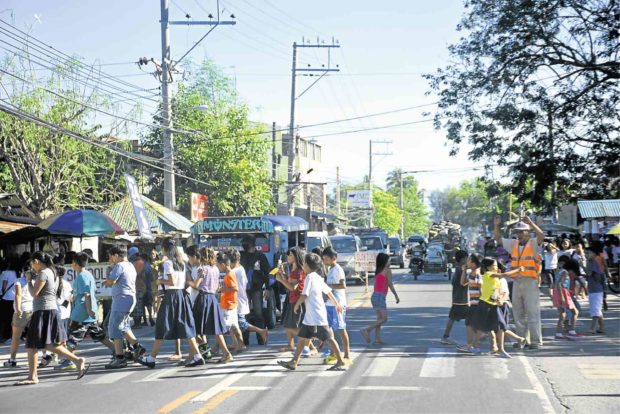Who wants to be a ‘barangay kapitan?’

ROAD SAFETY Among tasks given to village officials is to ensure road safety in their communities, especially in school zones, such as this area at Barangay Bonuan Gueset in Dagupan City. —WILLIE LOMIBAO
DAGUPAN CITY — From 5:30 a.m. to 8 p.m. every day, Ricardo Mejia is in his office at the barangay hall of Bonuan Gueset, a coastal village in this city.
As chair of the barangay with the biggest number of voters in the city, Mejia and the village council were expected to deal with tasks that should make them more powerful than a mayor.
Each village council functions as the executive, the legislative and judiciary unit in the neighborhood.
And under the term of President Rodrigo Duterte, villagers were being given a key role in the campaign against drugs.
But Mejia, who has been serving as “kapitan” for 26 years, also has to oversee social services, health and nutrition, waste management, community daycare and other activities in his village.
Article continues after this advertisementTaxing jobs
Article continues after this advertisementHe sometimes implements infrastructure projects.
Mejia said the village government’s most time-consuming job was to operate the Lupong Tagapamayapa, which hears cases like oral defamation, unsettled debts and marital conflicts every Saturday.
“This is stressful because [as judge] you have to hear and balance both sides,” he said.
“Sometimes it is the offenders who report first, thinking the judgment would be in their favor. But we investigate and get neutral witnesses,” he said.
“We hear at least 10 problems every Saturday, with each case heard on three consecutive Saturdays,” Mejia said.
Fiefdoms
“If we are unable to solve the issues, we endorse them to the Pangkat Tagapagkasundo, which would mediate between the two parties,” he said.
Barangay governments are little fiefdoms, which were constitutionally required to solve problems at the grassroots, said Melinda Boada, city officer of the Department of the Interior and Local Government (DILG).
These have their own budgets and were entitled to shares from the internal revenue allotments (the total amount of taxes collected at a given year) and real property taxes, Boada said.
These also earn from fees for clearances and certificates and garbage collection.
Mejia’s barangay has a P16-million annual budget. But most villages have far smaller budgets and were forced to prioritize tasks and projects to avoid a bad audit report.
The tasks of the barangay heads were enumerated by the Local Government Code (Republic Act No. 7160). Among other things, they were required to enforce laws and ordinances within the barangay, and negotiate and sign contracts.
Countless tasks
They also organize and lead groups to maintain peace and order or to respond to emergencies or calamities in their villages.
They also coordinate with the barangay development council, prepare the annual executive and supplemental budgets, and enforce laws and regulations relating to pollution control and protection of the environment.
But every new law — whether national or local — adds to the barangays’ tasks.
For example, the Department of Social Welfare and Development required village chairs to identify the poorest families in their community for listing as beneficiaries of the government’s conditional cash transfer program.
There was no definitive compilation of tasks required of the village chair.
Growing list
Except those listed in RA 7160, the list of obligations grows, depending on how many local or national laws required barangay support, according to the DILG.
First-time village leaders were often shocked by the amount of work they must deal with after elections, but they learned to cope, Boada said.
“Some village officials dip into their pockets when the budget runs out,” said the DILG city officer.
“They even use their honorariums when a poor constituent asks for medicine money and other needs. They are also in charge of meals for visitors and whenever the barangay has activities,” she added.
In spite of these overwhelming tasks, Mejia said he would seek reelection on May 14 for what could be his last term.
“Maybe it’s in the blood,” said Mejia, who is a third generation village leader in the family. His grandfather, Ireneo, and his father, Natalio, were also village chiefs.